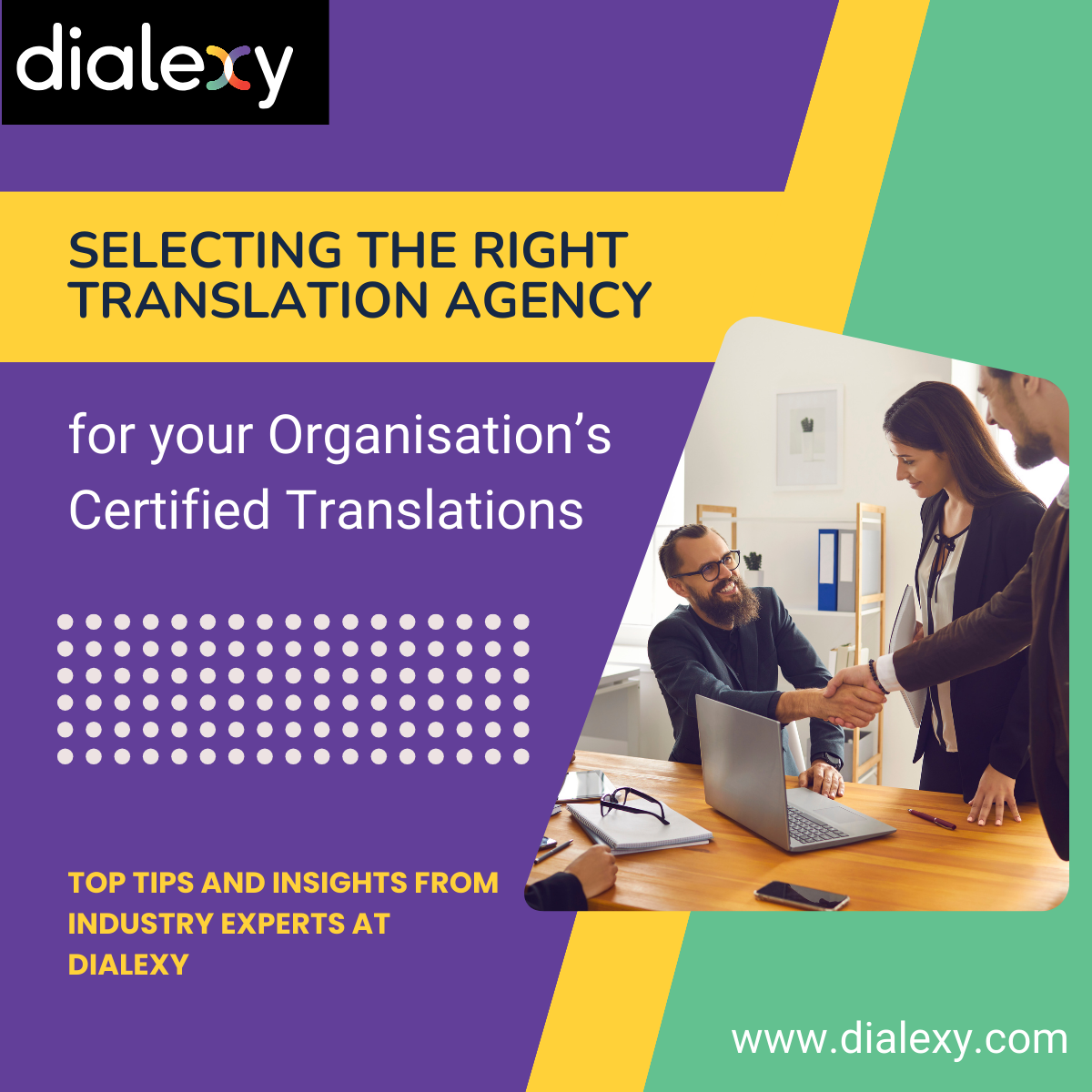
How to Select the Right Translation Agency for your Organisation’s Certified Translations
How to Select the Right Translation Agency for your Organisation’s Certified Translations
Top Tips and Insights from Industry Experts at Dialexy
In today's globalised world, accurate translation services are crucial for businesses, organisations, and individuals alike. When it comes to certified translations, such as those required for legal or official purposes, choosing the right translation agency becomes even more critical. With varying standards across different regions, ensuring accuracy and reliability is paramount. In the UK, for instance, the standards for certified translations may seem minimal, but the implications of inaccuracies can be significant.
Understanding UK Standards for Certified Translations
In the UK, certified translations are typically required to meet basic criteria: the translation provider (translator or company) must attest to the accuracy of the translation to the best of their knowledge, provide their contact details, and include their signature along with the date of their translation. There is no minimum requirement in terms of qualification or quality assurance, which leaves considerable room for potential errors and oversights. The risk inherent in relying on translations of uncertain quality is substantial, particularly for organisations dealing with legal or immigration matters.
What is a Certified Translation?
Certified translations, also called "official translations" or "sworn translations", are translations of official documents that come with a statement made by the translator or translation company guaranteeing its accuracy, along with the date, the translator's credentials and contact details. Organisations such as the UK Home Office, the HM Passport Office and other UK Government Agencies, Universities, Training and Academic Institutions, Regulatory and Professional Bodies, as well as Embassies and Consulates all require certified translations.
Our handy collection of official documents guide, will help you navigate commonly requested documents requiring certified translations here.
The Risks of Inaccurate Translations
Organisations relying on inaccurate translations face various risks, including legal repercussions and reputational damage. For instance, imagine a scenario where an educational institution admits a student to their course based on their (poorly) translated international qualifications and later discovers inaccuracies during an audit by the Home Office. Such discrepancies could lead to the revocation of the institution's sponsor license, resulting in financial losses and reputational harm. Not to mention the individual impact on staff and students. Ultimately, it is the responsibility of the institution to ensure the accuracy and acceptability of translated documents and this is unfortunately often overlooked.

Key Factors to Consider When Choosing a Translation Agency
Given the potential consequences of inadequate translations, it is essential to carefully select a reputable translation agency. Here are some key factors to consider:
- Expertise and Specialisation:
Look for a translation agency with expertise in the specific field relevant to your documents and industry. Whether it's legal, medical, technical, immigration, or academic translations, specialists are better equipped to ensure accuracy and precision. Unfortunately, years of experience or the number of words translated does not guarantee high-level quality work.
Test the agency on their industry-specific knowledge before you partner with them!
This is our single most important tip for you to ensure you won’t be left working with somebody who might be an experienced translator but has little industry or document-specific knowledge which could get you and your organisation into trouble down the line.
- Custom Solutions:
Certified translation agencies which are able to provide custom services tailored to your oganisation’s specific needs will provide you with an invaluable advantage. While many agencies offer standard translation services, those that go the extra mile to understand your unique requirements and provide tailored solutions, can significantly enhance your and your clients’ experiences of the translation process and outcomes.
Discuss flexibility and scalability to suit your evolving and potentially changing requirements from the get-go.
Exploring options for personalised support from initial consultation to project management, and even post-delivery, should also be incorporated into your screening process.
- Turnaround Time and Flexibility:
Consider the agency's turnaround time and flexibility, especially if you often have urgent translation needs. A responsive agency capable of accommodating tight deadlines can be invaluable in time-sensitive situations. It is often helpful to discuss working hours, opening times and time zones when considering which agency you want to work with and ensure your expectations are aligned with what the company is able to offer.
- Quality Assurance Processes:
Inquire about the agency's quality assurance processes, including proofreading, editing, review procedures and certification. Most agencies will be ISO certified, most commonly complying with ISO 9001, the international Standard for Quality Management. Most importantly, for translation agencies, ISO 9001-2015 (the most recent revision of the ISO 9001 Quality Management Standard) only considers the documentation process of translations and how it’s being administered. Meaning, even if the company has a well thought through and ISO-certified documentation process, the risk of receiving badly translated documents still cannot be eliminated. This takes us back to our top tip of vetting the agency you’re working with and ensuring that their translators are experts in your chosen industry.
A reliable agency will have stringent quality control measures in place for both documentation processes and translation checks to minimise errors and ensure consistency.
- Cost and Transparency:
While cost is undoubtedly a factor, prioritise value over price alone. Beware of excessively low rates, as they may indicate subpar quality or hidden costs. For example, some agencies will advertise certified translations but do not initially show quotes for the certification process or what type of certification they offer. This can result in headaches and lost time for individual and corporate clients alike. Having clarity around the type of certification on offer and what you actually need is also very important. Different countries and institutions have varying requirements towards ‘certification’ (sworn translations, notarised translations, UK-certified translations, etc.).
Familiarising yourself with the certification requirements prior to contracting a translation agency can also save you money and time. Choose a translation agency that offers transparent pricing and delivers excellent value for your investment.
And if you’re unsure, ask questions specifically about whether certification is included in the price and what type of certifications they offer, to avoid surprises.
- Translator Qualifications and Accreditations:
You will notice how qualifications are not the highest on our list and this is for good reason. Granted, assessing the qualifications and experience of the translators employed by the agency should be part of your screening process, qualifications alone will not guarantee high-quality translations.
Ideally, translators should be both native speakers of the target language and also have expertise in the subject matter of the documents being translated. Another great solution, as part of quality control (see above), is when the agency ensures the cross-checking of translations. For example, by employing both a native speaker of the target language and a native speaker of the source language, with industry-specific knowledge. to work together on proofreading translations.
If you wish to verify that the translation agency adheres to industry standards and holds relevant certifications or accreditations, you could look for certifications from bodies such as the Association of Translation Companies (ATC) which can indicate organisational commitment to quality and professionalism.
Individual translators also often become members of and are certified by professional translation associations such as ITI and CIOL in the UK, ATA in the United States, and CTTIC in Canada, or become sworn translators of countries where translation is a regulated profession.
Whilst membership of these organisations, associations and governing bodies is a good indicator of professional commitment, it’s important to consider other key factors than just accreditations and memberships, when evaluating a translation agency.
- Confidentiality and Security:
Ensure that the translation agency prioritises confidentiality and data security. Confidential information contained in documents must be handled with the utmost care and protected from unauthorised access or disclosure.
- Customer Reviews and Testimonials:
Seek feedback from past clients or look for testimonials to gauge the translation agency's reputation and track record. Positive reviews and testimonials are indicative of satisfied customers and good service, however, it can be beneficial to also consider the negative comments which can reveal areas for improvement within the company.
Address any lingering questions you may have prior to signing that contract!
- Positive Relationships:
Fostering positive working relationships is paramount in any partnership your organisation enters. When selecting a certified translation agency, consider their approach to communication and collaboration. A translation agency that values open dialogue, listens to your needs, and provides personalised attention, can significantly enhance the translation process.
Have a strange gut feeling after your discovery call?! Maybe it’s time to shop around!
Getting a good overall feel for the agency, their staff, branding and organisational culture is so important!
Take Aways
Selecting the right translation agency for certified translations is a decision that should not be taken lightly. By considering factors such as industry knowledge and expertise, quality assurance processes, customer feedback, and your customer service experiences with them, you can mitigate the risks associated with inaccurate translations and ensure the integrity of your and your clients’ documents.
Remember, the consequences of poor translation quality can far outweigh the initial cost savings, making it imperative to prioritise quality and reliability above all else.
Looking for your next certified translation partner?! Let’s Chat!
Email us today via info@dialexy.com!
